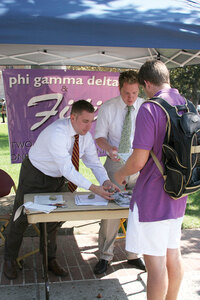Phi Gamma Delta fraternity returns to USC
After a nine-year hiatus, Phi Gamma Delta, an international fraternity also known as “Fiji” or “Phi Gam,” returned to campus this semester and is prepared to deal with the issues that forced it from The Row initially.
Because of financial difficulties, Fiji closed its USC chapter in 2000 to pay off accumulating debts. With its return this year, members are making plans to keep this kind of problem from happening again.

Comeback · Recruiters from Phi Gamma Delta’s national office tell sophomore Collin Rice about the fraternity, which has returned to USC. - Dieuwertje Kast | Daily Trojan
“We have an alumni adviser who is our financial adviser that will work hand-in-hand with the treasurer to look over the budget,” said Justin Burns, national director of chapter development. “The undergraduates are still in charge, but we have amazing alumni who … are advising in their areas of expertise.”
Its debt paid off, Fiji wanted to return to USC, so it applied and was selected by the university and the Interfraternity Council from among a number of international fraternities.
Ray Carlos, assistant director of Fraternity and Sorority Leadership Development at USC, said Fiji was selected because it has both a good system in place and an existing house on The Row.
“[Fiji] has alumni who are very involved on this campus. They have a very strong international headquarter, which means they have a number of people who can give resources and support for the chapter and the colony here,” Carlos said. “But most of all, they were very interfraternal. They knew that they were not going to come in and focus on themselves — they want to make the entire community better,”
The Fiji house, located on The Row, is currently leased to students from other fraternities and sororities. Though Fiji has returned to USC, the current residents will be allowed to remain in the house until their leases expire, Carlos said.
Meanwhile, Fiji is working to recruit a strong class of new members.
The fraternity has been contacting sorority chapter presidents, asking them to help find men on campus who are not Greek but would like to help start a Greek organization, Carlos said. Blessing Waung, president of the Panhellenic Council, said the sororities are willing to help out as much as possible.
“If they have events they want us to come out to, we’ll definitely be there to support them,” she said. “We’re really excited because there are so many fraternities that are coming back.”
Burns said he encourages students to consider becoming involved with Fiji because they will have the chance to be part of its founding pledge class.
“They have a great privilege, but more so, a responsibility to create a fraternity that is unique to this campus,” Burns said. “Over the next year or so, as this group continues to develop, they are setting the course, they are setting the tone as to where this is going to go.”
The membership process is recommendation-based and there is no rush process, Burns said.
“It’s a mutual decision. The men that we’re meeting with need to take time to talk about it with their friends to think about it themselves and to ask questions,” he said.
Some students said they would consider pledging Fiji, as opposed to other IFC fraternities.
Nick Valerio, a freshman majoring in fine arts, said he liked that there was no rush process.
“I’d be interested because the whole rush process is this whole big ordeal that’s really time-consuming,” Valerio said. “A lot of people are really turned off to the whole rush/frat, kind of thing.”
In addition to the benefit of being able to join a fraternity without rushing, Danny Luber, a freshman majoring in psychology, said he liked that Fiji was an international fraternity.
“The international idea is pretty cool,” Luber said. “Also, I think it would appeal to people who are … [now] interested in being involved in that, but they don’t want to go through the whole rush process.”
The fraternity began to recruit members on Sept. 9 and will continue to recruit until Oct. 21.
